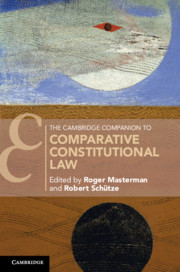Book contents
- Reviews
- The Cambridge Companion to Comparative Constitutional Law
- Cambridge Companions to Law
- The Cambridge Companion toComparative Constitutional Law
- Copyright page
- Contents
- Notes on Contributors
- Acknowledgements
- Table of Cases (Selection)
- Abbreviations
- Introduction
- Part I Theoretical Foundations
- Part II Historical Experiences
- Part III Constitutional Principles
- Part IV State Institutions
- 13 Parliaments
- 14 Governments
- 15 Administration
- 16 Courts with Constitutional Jurisdiction
- 17 Independent Fiscal Institutions
- Part V Transnational Constitutionalism
- Index
- References
15 - Administration
from Part IV - State Institutions
Published online by Cambridge University Press: 30 September 2019
- Reviews
- The Cambridge Companion to Comparative Constitutional Law
- Cambridge Companions to Law
- The Cambridge Companion toComparative Constitutional Law
- Copyright page
- Contents
- Notes on Contributors
- Acknowledgements
- Table of Cases (Selection)
- Abbreviations
- Introduction
- Part I Theoretical Foundations
- Part II Historical Experiences
- Part III Constitutional Principles
- Part IV State Institutions
- 13 Parliaments
- 14 Governments
- 15 Administration
- 16 Courts with Constitutional Jurisdiction
- 17 Independent Fiscal Institutions
- Part V Transnational Constitutionalism
- Index
- References
Summary
Honest and competent administration is essential to legitimate constitutional government. Administrators make rules with the force of law and apply the law to particular cases. The case-by-case implementation of established policies requires citizens to trust in the impartial application of the law. However, impartiality is not sufficient for administrative legitimacy. In addition, policymaking by the executive and the agencies needs to be consistent both with the competent use of expertise and with accountability to citizens and interest groups. Policymaking delegation is the inevitable result of the weakness of the legislative process as a site for detailed policy prescriptions. Gaps and ambiguities are inevitable. Furthermore, the electoral process is too aggregated and episodic to be the only legitimate route for citizen influence on policymaking. Referenda and surveys are not a responsible option for most policy choices; they risk measuring the views of uninformed individuals, often reacting to emotional appeals. Hence, other routes to public involvement beyond voting and surveys are a crucial aspect of legitimate, representative democracy. Administrative law scholarship needs to articulate practical ways to combine public input with the competent application of technical information to policy.
- Type
- Chapter
- Information
- The Cambridge Companion to Comparative Constitutional Law , pp. 391 - 413Publisher: Cambridge University PressPrint publication year: 2019



